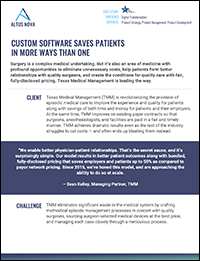Digital Transformation
Custom software saves patients in more ways than one.
Surgery is a complex medical undertaking. But it’s also an area of medicine with profound opportunities to eliminate unnecessary costs, help patients form better relationships with quality surgeons, and create the conditions for quality care with fair, fully-disclosed pricing. Texas Medical Management is leading the way.
Client
Texas Medical Management (TMM) is revolutionizing the provision of episodic medical care to improve the experience and quality for patients along with savings of both time and money for patients and their employers. At the same time, TMM improves on existing payor contracts so that surgeons, anesthesiologists, and facilities are paid in a fair and timely manner. TMM achieves dramatic results even as the rest of the industry struggles to cut costs — and often ends up bloating them instead.
We enable better physician-patient relationships. That’s the secret sauce, and it’s surprisingly simple. Our model results in better patient outcomes along with bundled, fully-disclosed pricing that saves employers and patients up to 50% as compared to payor network pricing. Since 2015, we’ve honed this model, and are approaching the ability to do so at scale"
Challenge
TMM eliminates significant waste in the medical system by crafting methodical episode management processes in concert with quality surgeons, sourcing surgeon-selected medical devices at the best price, and managing each case closely through a meticulous process.
TMM does this by managing:
- Time. TMM contracts with quality surgeons in each geography, as the hours required to perform a procedure can differ dramatically for an average surgeon as compared to a quality surgeon.
- Steps. From the right facilities to anesthesia, equipment, implants, medication, and more, TMM ensures that the surgeon’s treatment plan is executed well.
- Budget. TMM strategically procures treatment plan components such as implants at reasonable costs from surgeon-selected quality suppliers, saving budget as compared to device company facility pricing.
- Transparency. TMM publishes the pricing for each treatment plan and ensures completeness of the care episode so patients and employers understand all costs upfront, with no surprises. Unlike traditional insurance companies, TMM’s model allows purchasers to compare pricing prior to service and share savings with patients.
- Friction. TMM manages each care episode directly with the patient, providing expert advice and advocacy, helping them understand what to expect, and coordinating imaging, labs, studies, and more so that patients have one point of contact.
- Effort. TMM surgeons define each treatment plan in advance, creating a bundle. Each bundle is a surgeon’s treatment plan to address a specific diagnosis. The bundled price applies to all patients with the same diagnosis.
Note: 95% of all bundles are surgeon and facility specific.
TMM’s sensible, practical yet uncommon approach has reduced surgical costs to patients and employers across a range of procedures — often saving up to 50%. TMM makes money by adding a margin to the combined provider costs.
Achieving dramatic efficiencies requires a rigorous process for each episode of care, intelligent treatment plans designed by top surgeons for each procedure, and the organizational discipline to stick with the process.
As TMM scaled, they knew they needed custom software to ensure:
- Precision. Each diagnosis requires an expert surgical treatment plan, meticulous case coordination, and seamless handoffs from initial surgical consultation to purchaser billing and provider payouts.
- Automation. Every significant event related to the case must be immediately and automatically communicated to stakeholders including the patient, the employer, the surgeon or providers, and the facility.
- Trackability. All information related to each case, whether communicated by email, SMS, phone, or chat needed to be logged and easily accessed by any team members on the case.
- Quality. Any issue or delay impacting a case must be immediately identified and spotlighted to case managers so that Service Level Agreements can be reliably maintained.
- Repeatability. Training for new TMM hires needed to be eased by a more intuitive visual interface that could offer guidance and prevent unintended wrong actions, but without slowing down power users.
- Visibility. TMM leadership needed easy oversight of each department, treatment plan, and case under TMM management.
TMM needed an intelligent system to navigate complex cases at scale. To succeed in the face of this significant technology challenge, TMM called on Altus Nova to help define and develop software to best support TMM’s exacting business model.
Discovery
Altus Nova worked closely with TMM to define pain points and success criteria. Together, we embarked on an extensive mapping of the end-to-end business processes — from a new case inquiry to data collection after a completed procedure — to capture the true current state of TMM operations.
To guide the way to an MVP solution, Altus Nova formulated an execution plan that ultimately delivered the MVP on schedule and on budget, exactly as planned.
![[object Object]](/_next/image?url=https%3A%2F%2Fcdn.sanity.io%2Fimages%2Ffiodz0wg%2Fproduction%2Fa3af7458129dd03b6e0d46e7fa72a837e3c41167-1587x877.jpg%3Ffit%3Dmax%26auto%3Dformat&w=3840&q=75)
Mapping business processes up front aligned the Altus Nova and TMM teams around the complexity of their decision-making, the necessary information and communication points for case management, and the multiple handoffs that must occur seamlessly between team members to facilitate the patient journey.
It also illuminated the unique view of shared information that external parties including surgeons, care navigators, and facilities needed to stay in sync throughout that journey.
Finally, it allowed stakeholders to define the decision-making audit trail, service quality markers, and functionality needed to minimize mistakes and optimize managerial support in the case of difficult situations during a patient journey.
With a clear map of the problem, Altus Nova worked with the TMM team to define a future-state vision for their custom software. We prioritized a list of must-have, should-have, could-have, and won’t-have features with input from all TMM stakeholders. Updated process flows, wireframes, and mock- ups enabled everyone to see how TMM would measure key performance indicators (KPIs) for the project.

